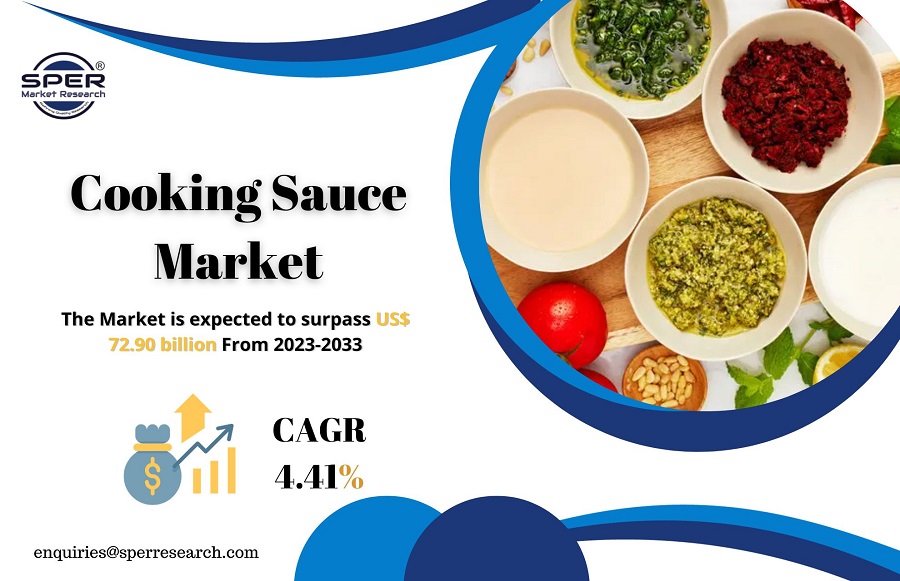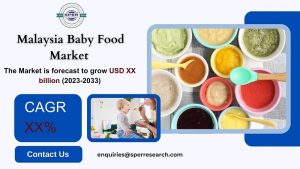When food is being cooked, cooking sauces—which are liquid or semi-liquid preparations—are used to improve its flavour and taste. Vegetables, herbs, spices, and seasonings are frequently combined to create these sauces. There are many other flavours that they come in, such as pasta, stir-fry, tomato-based, curry, and barbecue sauces. Cooking sauces are made to make meal preparation easier, enhance flavour depth, and give customers a ready-to-use, handy solution.
According to SPER market research, ‘Cooking Sauce Market Size- By Type, By Product, By Application, By Distribution Channel- Regional Outlook, Competitive Strategies and Segment Forecast to 2033’ state that the Cooking Sauce Market is predicted to reach USD 72.90 billion by 2033 with a CAGR of 4.41%.
The growing need for quick and easy dinner options has led to a notable increase in the market for cooking sauces in recent years. A vast array of flavours and variations of cooking sauces are available in the market, satisfying a wide variety of consumer tastes. The industry is rising due to factors like busy lifestyles, the growing popularity of ethnic cuisines, and the demand for restaurant-caliber meals at home. To obtain a competitive edge in this fiercely competitive industry, major competitors are concentrating on product innovation, marketing tactics, and increasing distribution networks.
However, raw material price fluctuations have a cascading impact on the cooking sauce industry, notably in sauce production that heavily relies on ingredients like vegetables, spices, herbs, and oils. When prices of these essential elements rise, it significantly inflates overall production costs, potentially squeezing sauce producers’ profit margins. Manufacturers confront additional hurdles, such as supply chain disruptions, competition, and investment challenges. While raw material price shifts persist as a constraint, proactive measures are vital to ensure industry stability and quality, necessitating ongoing vigilance and adaptability. Moreover, concerns about certain cooking sauces’ high sodium, added sugar, artificial additives, and preservatives have raised questions about their impact on nutrition and health. Consumer awareness of these issues may influence choices and potentially reduce the market for specific sauce varieties.
Request For Free Sample Report @ https://www.sperresearch.com/report-store/cooking-sauce-market.aspx?sample=1
Furthermore, cooking sauce sales have been significantly impacted by the Covid-19 epidemic. Convenient meal options became more in demand as a result of the pandemic’s lockdowns and limitations, which also encouraged cooking at home. To make meal preparation easier and enhance the taste of their handmade dishes, consumers started using cooking sauces. But the epidemic also brought with it difficulties for the market, including shake-ups in the supply chain, scarcity of some ingredients, and variations in demand. In addition to making ensuring essential components were available, manufacturers also had to handle safety issues in manufacturing facilities and adjust to shifting consumer tastes.
Geographically, North America, primarily the United States and Canada, constitutes a well-established market for cooking sauces, driven by its diverse culinary scene and cultural influences that fuel demand for various sauce flavours. In Europe, a preference for traditional and regional tastes is evident, shaped by culinary heritage and a quest for healthier sauce choices. The Asia Pacific, encompassing countries like China, India, Japan, and South Korea, is a significant market due to rich culinary traditions, diverse flavours, and growing demand for convenience. Latin America’s cooking sauce market is characterized by regional cuisines, such as Mexican, Brazilian, and Argentinean, with growth propelled by an expanding middle class, urbanization, and the need for convenient meal solutions. Additionally, some of the market key players are Bolton Group, Kikkoman Corporation, McCormick & Company Incorporated, Nestle SA, The Unilever Group, Others.
Cooking Sauce Market Key Segments Covered
The SPER Market Research report seeks to give market dynamics, demand, and supply forecasts for the years up to 2033. This report contains statistics on product type segment growth estimates and forecasts.
By Type: Based on the Type, Global Cooking Sauce Market is segmented as; Dry, Wet.
By Product: Based on the Product, Global Cooking Sauce Market is segmented as; Barbecue, Chili, Mustard, Soy, Tomato.
By Application: Based on the Application, Global Cooking Sauce Market is segmented as; Cafes, Households, Restaurants & Hotels, Street Food, Others.
By Distribution Channel: Based on the Distribution Channel, Global Cooking Sauce Market is segmented as; Convenience Stores, Hypermarkets, Supermarkets, Online.
By Region: This research also includes data for North America, Asia-Pacific, Latin America, Middle East & Africa and Europe.
For More Information, refer to below link:-
Related Reports:
Follow Us –
LinkedIn | Instagram | Facebook | Twitter
Contact Us:
Sara Lopes, Business Consultant – USA
SPER Market Research
+1-347-460-289974



